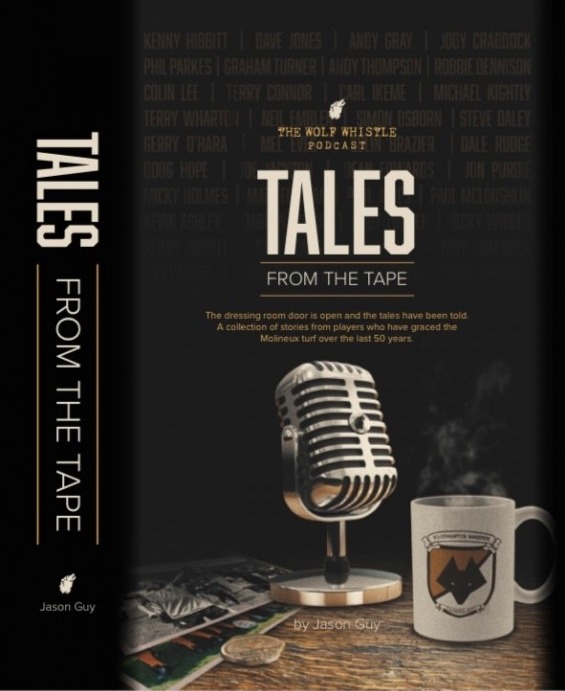
Joe Jackson
every boy's dream
He’s one of our own. Growing up as a young Afro-Caribbean boy in Whitmore Reans in the late 1970’s was a tough gig. West Park was his Wembley and a young Joseph Jackson could hear the roar of the Molineux crowd as he listened in awe and gazed up at the towering floodlights that cast their shadow over Waterloo Road. Going to the game to watch his heroes wasn’t an option. Finances in the Jackson family were tight and all he could do was dream of going through the turnstiles. All he could ever do, was dream of playing for Wolves.
“I was a massive Wolves fan,” he begins. “All my family were Wolves fans growing up but we couldn’t afford to go to games so I would just listen to the crowd. My favourite players were John Richards, Willie Carr and Kenny Hibbitt and we had a great team. My earliest memory was when Wolves played Liverpool in 1978. It was my last year of Primary School and their fans took over the whole town. I remember looking up at the huge floodlights and seeing a Liverpool fan with his Union Jack flag. Wolves lost the game 3-1 and I never thought that I would ever be out on that pitch.”
Joe’s roots were embedded in a thriving, multi-cultural part of Wolverhampton and his junior football was as hardened as the streets he grew up on, where only the toughest survived. “I used to play with a bunch of mates at West Park which was near to my home. I always wanted to challenge myself so as an eight-year-old I am playing against 13-year-olds to make me tougher. There wasn’t an adult in sight, just young people on the streets working things out for themselves.”
Joe became as tough as the leather football that he would boot around and his efforts were rewarded with organised football in the form of a place in the school team and subsequently with Wolverhampton Boys playing at district level. “I’d been playing local football and got spotted playing for the District. I signed schoolboy forms at Wolves aged 14 and was just training but soon got released when I was 15.” Joe thought that this was the end of the dream.
He continued to play locally and, by chance, played in a local football tournament for a team called ‘Astro’ in an event organised by Wolverhampton Police. “It was about 18 months after I had been released and Wolves at this point had been taken over by the Bhatti brothers. Derek Dougan, who was Wolves chairman at the time, came down to present the trophies. It was just a five-a-side tournament that the Police had put on for the local lads in the community and was held down at the Polytechnic. Derek was there and he had watched me play and asked me if I wanted to go to Wolves for a trial. ‘Yeah, no problem’, I told him, but I didn’t tell him that I had been released 18 months earlier. ‘When do you want me to come down’?”
In a matter of weeks Joe was back on his way to Wolves for a month’s trial. Joe impressed the Doog and started his Wolves dream all over again. “I was 17 at the time. I had been playing at Willenhall Town in their youth team so I was making a name locally. It was a month’s trial at Wolves and it went well and being spotted like that just wouldn’t happen now in today’s game. Football has now gone too far the other way. That was the authenticity of the whole process.”
Joe was awarded a YTS apprenticeship contract and cut his teeth in the youth and reserve sides at Molineux. Wolves’ fortunes had begun to take a turn for the worse and the finances at the club at that time were no better than of those in the Jackson household. Could Joe have seen a pathway from the streets surrounding Molineux to being revered, like his heroes from the terraces that he never even had the chance to go on? “All of a sudden you are around all the top boys and rubbing shoulders with your idols. Geoff Palmer, Andy Gray, Mel Eves and my hero growing up – Kenny Hibbitt. Even when I was in the youth and reserve teams we would be with the first team players every day.”
Joe made history. Unbeknown to him at the time Joe Jackson became the first home- grown black player to play for Wolves, an honour of which he and his family are rightly very proud. It was the evening of May 1st, 1984, and it was Jim Barron who gave Joe his big chance. Wolves travelled to Notts County in a First Division fixture, top flight of English football, and Joe Jackson made his debut. It would also prove to be his last ever game for Wolves, his solitary appearance for the club.
Wolves lost the game 4-0, which isn’t important, and a crowd of no fewer than 5,378 were present to see Joe make history. “I had been made aware the day before,” he recalls. “I had been in and around the first team for a little while and knew it was leading up to something. I had travelled with the first team a couple of times and I had helped put the kit out and so on and been integrated with the first team.”
The team that day was: John Burridge, John Humphrey, Gordon Smith, John Pender, Alan Dodd, Tony Towner, Billy Livingstone, Scott McGarvey, Martin Bayly, Paul Dougherty… and Joe Jackson, ironically replacing his exemplar, Kenny Hibbitt.
“The game literally just came and went in a flash,” said Joe. “I was so in awe of the personnel on the pitch that it just passed me by. I was looking round thinking, ‘I’m here’. In the Notts County team were Trevor Christie, Martin O’Neill, John Chiedozie. Some real names. We had John Burridge who was a real character. You would never know what he was going to do next but on the day he really helped me and calmed my nerves.”
On the Saturday before, Wolves had faced West Brom at Molineux in front of 13,084 spectators. I joked with Joe that he could have made his debut that day, in a Black Country derby. “If only!” is his reply. “They had some real role models for me growing up in their side. Playing against Laurie Cunningham, Brendon Batson and Cyrille Regis really would have been a dream debut. Those players gave us that staying power, that if they can do it then so can we.”
The ‘Three Degrees’, as they were dearly known, paved the way for black players during a time of racial tension as this vitriol was prevalent on the terraces. “I didn’t really face any racism growing up but maybe I didn’t notice it. When I got to Wolves, I did start hearing comments from the crowd and in the stands. It was really at the age of about 18 or 19 that I realised the level of racism that there actually was.”
As well as the trailblazers at The Hawthorns who had been pioneering for other black players to make their way in the professional game, Joe had previously been in good company. “I believe George Berry and Bob Hazell were the first two black players to play for Wolves but they were before my time. Something I realised three years after my debut was that I was the first black, homegrown player to play for Wolves. At the time nobody mentioned it and even acknowledged it. Looking back now, it made my debut much more important.”
The dream was lived. Joe wore the shirt and had made history. Duran Duran were number one in the charts with ‘The Reflex’ and Liverpool won the league that year, in the division that Joe had played in. It wasn’t to be the pop star lifestyle or indeed the fairy-tale ending for Joe. That was his 90 minutes of fame. “It was a fantastic experience and I can look back on it all with really fond memories. My family and friends were really proud and the people in the local Afro-Caribbean community saw me as one of their own and representing them. You don’t set out to do that but on reflection, you see it as a massive step.”
I asked Joe if there were any regrets. Would he have liked to have played a few more games, or was it perversely more special being just one game? “You want to go beyond that, stay at that level and show consistently what you can do but, I did it. I don’t look at it any other way, I was honest as I could be and it is what it is.”
Joe may have felt a little melancholy but he had by far outlived his expectations anyway and now, he has only one dream left. “My grandson, little Ricky, is in the academy at Wolves playing for the Under 10’s, and I would love him to make it and play for Wolves like his Grandad did. That would be my biggest dream come true.” You never know Joe, stranger things have happened. One day we may see another Jackson at Molineux.
The floodlights had now dimmed and Joe was no longer, hungry like the wolf. “When I left Wolves, I lost my appetite. I had started to enjoy my football then it began to feel like work and like what I would expect a normal job to have felt like. After Wolves I went to Bilston Town and played with my mates and started to enjoy the game again. I then climbed back up through non-league and spent three successful years at Dover. I then managed Bilston and Stourbridge when I finished playing and also Bromsgrove for a short time, but it felt like every season at that level you had to start again.”
You would have thought that Joe may have turned his back on football, but it has quite literally been his life. “I have never worked away from football. Even as a semi-pro I was looked after so it meant I didn’t have to work. I originally worked at Bilston Community College as a ‘Football Development Officer’ where I ran the football programme. I then set up NPV Football Development using football as a tool to take people off the streets and it’s a programme that centres around gang prevention and intervention and I have been doing that for over 20 years. We have helped literally hundreds of kids from the tougher, inner-city parts of Wolverhampton and created a space for youngsters to come and play football.
“We have a relationship with Wolves and from time to time we tell them to come and have a look at the talent we have got. We have had coaches who have gone on to become full time coaches at league clubs and players who have turned professional too. We haven’t had one play for Wolves yet but there is still time. I work with each and every one of them and instil them to be on time, organised, committed and we teach them life skills so that they can hopefully eventually go on to support their own families.”
Joe has rightly gained recognition widely for his efforts. In 2013, Joe was invited to Buckingham Palace, on behalf of the FA, to be presented with one of 150 long service awards, on the 150th anniversary of the FA, by none other than HRH Prince William. A huge accolade for a man with a huge heart.
Faith is now an important part of Joe’s life and in 2005 he became a born again Christian. “It’s a big driver in why I do what I do. Reaching out trying to give people opportunities. Unlocking hidden potential and football gives me that path to engage.”
Joe Jackson really is, in the true sense of the expression, a poacher turned gamekeeper. “It’s quite strange really, looking back, that tournament that was organised by the Police could have all been put together to keep guys like me off the streets.”
Joe, that’s exactly what it was and it led you to live ‘every boy’s dream’.



